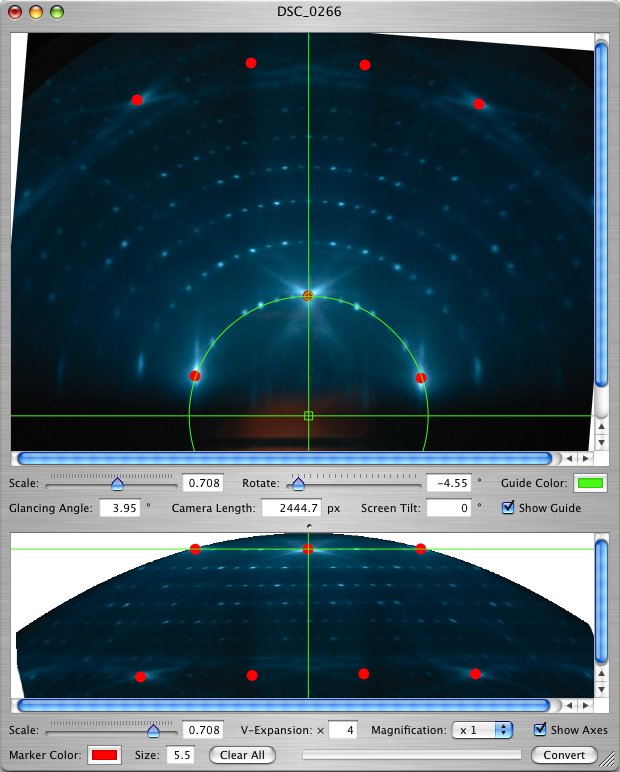RHEED Converter X
|
|
|
— RHEED Pattern→2D Reciprocal Space Converter —
|
|
Table of Contents
RHEED Converter X is an application software which converts a RHEED (Reflection High-Energy Electron Diffraction) pattern into a 2-dimensional reciprocal lattice image.
It is useful for surface reconstruction study with RHEED.
This software can read any kind of image which is supported by MacOS X (TIFF(8/16 bits), JPEG, PICT, BMP, PDF etc.).
The converted image can be exported as a TIFF, JPEG or PNG image file.
The figure below is an example of the document.
Please refer to the help menu of the application for detail.
- Operating System:
- MacOS X 10.4 (Tiger). Optimized both for PPC and Intel Mac (Universal Binary). If you use MacOS X 10.3, please get an older version 1.0.1 (the same functionality as 1.1).
- Hardware System:
- Any Macintosh which is running under the above operating system.
- License Agreement:
- This software is free for nonprofit scientific research use. If you want to use it for commercial enterprise, please contact to the author below.
The author is NOT obliged to compensate any damage or loss to your data, your computer, nor your business. Be sure to backup important data by yourself.
- Redistribution:
- You can redistribute it within your research group. Otherwise, please tell him this URL and ask him to download by himself (to give him a chance to access to the latest information).
Click here to download the latest version (Version 1.1, RHEED_Converter_X.zip, Size: 3.7MB)
Click here for older version 1.0.1.
Just copy an application (RHEED Converter X) to anywhere you want (generally, Applications folder in your system is a right place).
Remove the following 2 items;
- an application (RHEED Converter X)
- a preference file (Home/Library/Preferences/com.hit-c.com.hit-c.RheedConverterX.plist)
No. 2 exists for each user.
- 1.1
- Re compiled for universal binary. No other functionality is added.
- 1.0.1
- Remove extension name .rconv from default file name when an image is saved in general image format.
- 1.0
If you find a bug, please contact to the author by an e-mail.
Hitoshi Nakahara: nakahara@@nagoya-u.jp (@ is doubled to prevent spams)


